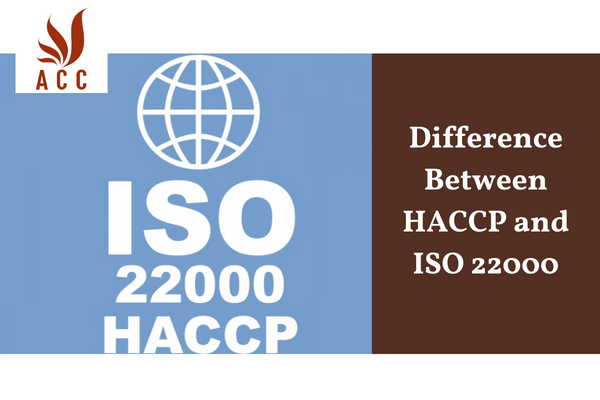HACCP stands for Hazard Analysis and Critical Control Points. It is a preventive approach to food safety that focuses on identifying and controlling hazards that could cause foodborne illness. ISO 22000 is an international standard that incorporates the principles of HACCP. It provides a more comprehensive approach to food safety that includes requirements for all aspects of food safety management, including documentation, record keeping, and training. In this article, we will compare and contrast HACCP and ISO 22000. We will discuss the similarities and differences between the two systems, and we will provide guidance on which system is right for your business.

Difference Between HACCP and ISO 22000
1. Introduction
Food safety is a critical issue for businesses in the food industry. By implementing a food safety management system (FSMS), businesses can help to ensure that their products are safe for consumers.
There are two main FSMSs that are widely used in the food industry: HACCP (Hazard Analysis and Critical Control Point) and ISO 22000. Both systems are designed to help businesses identify and control food safety hazards. However, there are some key differences between the two systems.
In this article, we will discuss the key differences between HACCP and ISO 22000. We will cover the following topics:
- What is HACCP?
- What is ISO 22000?
- Similarities between HACCP and ISO 22000
- Differences between HACCP and ISO 22000
- Conclusion
2. What is HACCP?
HACCP is a preventive approach to food safety that focuses on identifying and controlling hazards that could cause foodborne illness. HACCP is based on seven principles:
- Hazard analysis: Identify and assess the hazards that could cause foodborne illness.
- Critical control point (CCP) determination: Identify the points in the food production process where control can be applied to prevent, eliminate, or reduce hazards to acceptable levels.
- Critical limit (CL) determination: Establish limits for each CCP to ensure that the hazard is controlled.
- Monitoring procedures: Establish procedures to monitor each CCP to ensure that the CLs are met.
- Corrective action: Establish procedures to take when monitoring indicates that a CCP is not under control.
- Verification procedures: Establish procedures to verify that the HACCP system is working effectively.
- Record-keeping: Establish procedures to document the HACCP system.
3. What is ISO 22000?
ISO 22000 is an international standard for food safety management systems. ISO 22000 is based on the principles of HACCP and also includes additional requirements for food safety management.
The requirements of ISO 22000 are divided into 10 clauses:
- Scope
- Normative references
- Terms and definitions
- Context of the organization
- Leadership and commitment
- Planning
- Support
- Operation
- Performance evaluation
- Improvement
4. Similarities between HACCP and ISO 22000
Despite their differences, HACCP and ISO 22000 have some similarities. Both systems are designed to help businesses identify and control food safety hazards. Both systems also use the seven HACCP principles as a foundation.
5. Differences between HACCP and ISO 22000
The main difference between HACCP and ISO 22000 is that ISO 22000 is a more comprehensive standard. ISO 22000 includes additional requirements for food safety management, such as:
- The need for a documented food safety management system (FSMS)
- The need for management commitment to food safety
- The need for a risk-based approach to food safety
- The need for preventive action
- The need for corrective action
- The need for verification
- The need for improvement
Another difference between HACCP and ISO 22000 is that HACCP is a more flexible system. HACCP can be adapted to fit the specific needs of a business. ISO 22000 is a more prescriptive system. It provides specific requirements that businesses must meet.
HACCP and ISO 22000 are both effective FSMSs that can help businesses to ensure the safety of their food products. ISO 22000 is a more comprehensive standard that includes additional requirements for food safety management. However, HACCP is a more flexible system that can be adapted to fit the specific needs of a business.
The best FSMS for a particular business will depend on the specific needs of the business. Businesses that want to implement a comprehensive FSMS that meets international standards should consider ISO 22000. Businesses that want a more flexible FSMS that can be adapted to their specific needs should consider HACCP.
Nội dung bài viết:






Bình luận